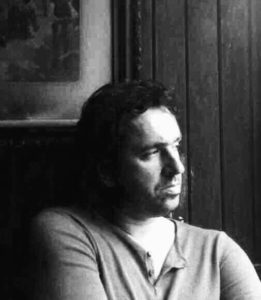
The Director of Get the Chance, Guy O’Donnell recently got the chance to chat with playwright Meredydd Barker. We discussed his career to date, ‘Nye and Jennie’ a new play he has written for Theatr na nÓg and his thoughts on theatre in Wales.
Hi Meredydd great to meet you, can you give our readers some background information on yourself please?
I was brought up on the ultra rural north coast of Pembrokeshire; potato fields, big sky and sea. My father, Gordon, was an engineer from Buxton in Derbyshire who came down to St Davids to wire up a moulding factory. Being a field sports and sea fishing fanatic he stayed. It was heaven to him. My mother, Ruth Barker, was a Welsh singer-songwriter – she was quite well known in the seventies and eighties – so the idea of self-expression through the arts was a natural one. Such a rural upbringing meant the winter nights were about reading and drawing. I was an introspective kid anyway. Somehow I got into rock music, and around the age of fourteen I read the Jim Morrison biography, ‘No-One Here Gets Out Alive.’
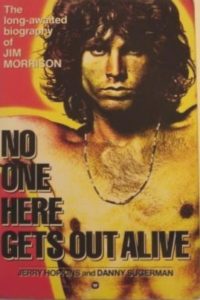
I wanted to study what he read as a teenager – the beats, French symbolist poetry et al – and so became a voracious reader. I also wrote some dreadful poetry. My other great love was visual art. I didn’t want a lecturer telling me what to read on literature course so it seemed natural to go to art college, all the while writing ideas for stories and observations in my sketchbooks. I ended up getting a degree from St Martins College in London. I did some teaching there at the Centre for Languages – mostly English to Japanese fashion students – but I wasn’t creatively happy. It was around that time I met my wife who was working at The Everyman theatre in Liverpool. I followed her there and found myself going to the theatre maybe three times a week. One night, after seeing something particularly dire on stage, I decided that I should try writing a play. I felt I could do better than what I’d just seen. So I wrote The Rabbit which was picked up by Terry Hands at Theatr Clwyd. It wasn’t only my debut but the first play that I’d ever written, so to have it directed by him ranks as one of the very most incredible things to ever happen to me. And here I am.
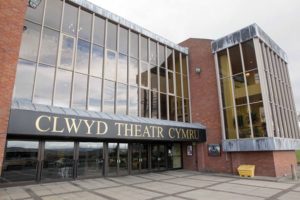
You are currently working on a new play called ‘Nye and Jennie’ for Theatr na nÓg. How did you come to be involved in this new production and can you tell us more about it?
Geinor Styles, Artistic Director of Theatr na nÓg, had read Jennie Lee’s autobiography, ‘My Life with Nye.’ She was bowled over by the story of this woman: first ever minister for the arts, prime mover behind the creation of the Open University and so much more. But she was overshadowed, as anyone would be, by Nye Bevan, her husband. Geinor had a hunch that I’d be a good fit when it came to writing a play about them. I did some reading, took a very deep breath, and said yes. It’s a two hander and so I hope the play has an intimacy in and of itself as explores what it meant to be two people in love who also happened to be creating two political legends in a time of immense domestic and international upheaval.
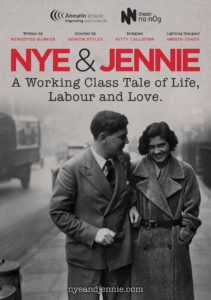
The play is described as a ‘Working class tale of Life,Labour and Love’ With the recent production of We’re Still Here by National Theatre Wales portraying the lives of Neath Port Talbot Steel Workers and this new production examining the political background and personal inspiration of Aneurin Bevan and Jennie Lee do you feel that Welsh Theatre is presenting representative stories of its citizens on our stages?
Not as much as it thinks it does. If you want to get a sense of what sort of lives people are leading you need a sense of place. The psychogeography of a play is quite fragile and it demands a sensitive touch from directors which it quite often doesn’t receive. It doesn’t survive the director’s process or vision or whatever they might want to call it. There’s no point enlisting a local playwright if an outsider is going to butcher it to fulfil their own agenda, which can often be brimful with some quite inaccurate preconceptions about a place and its people. But if those inaccuracies are camouflaged by bright lights and pretty soundscapes with a couple of laughs and a tearful middle eight then what price being representative? The five-star review is what’s important, not the lessons that may be learned. But giving the audience what it wants isn’t the same as holding up a mirror.
You’re telling a story. It’s one of many stories. But you’re telling us that this is the story that needs telling. Is that because it contains an essential truth that’s not being expressed? Or is it because it fits the world view you arrived with and you know it fits it into your particular blunderbuss of theatrical tricks? There are truths in peoples lives – the way they talk, why they say what they say, the way they treat each other with such casual brutality, the way they love – that lie at the heart and the heart is a difficult thing to get to but it’s the playwright’s job to do that. Trust the playwrights. Even if it’s difficult, even if it’s something you don’t believe, go with them.
Saying something difficult is too often seen as synonymous with courting failure, especially if the production is on large scale. But there are communities in Wales that aren’t addressing their faultlines and if theatre can’t point that out then it doesn’t deserve to call itself art because art, if it’s about anything, is about saying the difficult thing.
There are times when an outsiders point of view is exactly what’s needed. But not as often as that sentiment is used by outsiders as an excuse to defend their misconceptions. But, as I say, those misconceptions can be hidden with the smoke and mirrors of theatre with the result that nobody learns anything. There are exceptions and I’m working with an exceptional exception in Geinor and Theatr na nÓg.
The production information describes Bevan and Lee as “Aneurin Bevan and Jennie Lee were comrades and flatmates who together fought and preached for socialism as they saw it; he the Tredegar firebrand on the Labour backbenches, she the miner’s daughter from Fife who became a Socialist MP before she was old enough to vote.” Get the Chance is partially inspired from a conversation between the comedian Billy Connolly and former Scottish trade union leader Jimmy Reid. At Reid’s funeral in 2010 Connolly stated;
“I remember him saying that if you look at these housing estates and high-rise flats – look at all the windows. Behind every one of these windows is somebody who might be a horse-jumping champion, a formula one racing champion, a yachtsman of great degree, but he’ll never know because he’ll never step on a yacht or formula one car – he’ll never get the chance.”
Do you think opportunities still exist for young working class citizens from Tredegar or Fife to get the chance to actively engage in politics, the NHS or the arts today?
Two years ago I spent some time in Ebbw Vale working for the Shakespeare Schools Festival. I was able to see at first hand what the teachers in that area were like. Some were actually able to get some teaching done, but too many were just crisis managing. Provision for the arts in schools is dwindling so it’s difficult for pupils to get a good grounding in the craft. With the good grounding comes the ability to make an informed decision about whether it’s something you want to do with your life. But you need good examples to follow. Are any of the politicians around today worth emulating? There are some, but their philosophies are drowned out by the white noise most politicians mistake for public discourse. The NHS is being visibly driven into the ground in Wales so how can an adult recommend that a student devotes his or her future to something that’s being so devalued? In Fife good things are happening, but the ruling SNP is in a scrap with the Conservatives and Liberals over a new education programme which is stalling while they sort out their ideological differences. Who suffers? The pupil. Always the kids.
You are also Artistic Director of Narberth Youth Theatre. How did you come to be involved with this group?
My wife and I formed Narberth Youth Theatre because there was a need for something less formal than what the schools were offering, a place where the members could be themselves while they learnt more about theatre. Teenagers came to us and asked us to do it. And I must say it gives me the opportunity to work on my practice as a theatre maker week in, week out. We have guest facilitiators to keep things fresh and a great sense of curiosity in the group. It’s all good.
Get the Chance works to support a diverse range of members of the public to access cultural provision Are you aware of any barriers to equality and diversity for either Welsh or Wales based artists or specifically writers?
The greatest barrier is the geography of Wales itself. Just physically navigating it is hard. And theatre – like the mafia – is a face to face business. We all need to be able to go and see stuff, talk about it with the creatives, then get home. There won’t be any real consilience in Wales until that becomes easier. I scratch my head over the lack of matinees in Cardiff. In Liverpool the Everyman Playhouse has been experimenting with evening shows at 5-30 and audiences have responded positively to that. It means people from further away can get home or spend time in town and meet and talk and plan new alliances.
There are a range of organisations supporting Welsh and Wales based writers, I wonder if you feel the current support network and career opportunities for playwrights living and working in Wales feel ‘healthy’ to you?
If you’re a playwright, then you’ve made a tough choice in life. There’s only so much networks and organisations in Wales can do for a Welsh playwright. You really need to help yourself somehow. I’m forming my own company called The Holding Cell and I want see who I can attract to work with me and see if we can attract an audience because that’s what it’s all about. There are superb actors in Wales who aren’t even being seen for parts and I want to work with them, again in some cases. Let’s see what we can do for ourselves.
If you were able to fund an area of the arts in Wales what would this be and why?
Youth. It’s the law of initial conditions. Throw the ball high and hard – give it the best possible chance to travel far – then you’ll know it’ll go the distance. Invest in the beginning.
What excites you about the arts in Wales? What was the last really great thing that you experienced that you would like to share with our readers?
We’ve got astonishing actors here. That excites me more than anything else. It makes me want to write because I know that if I’m lucky enough to get into a room with Welsh actors I’m going to walk out with an enhanced piece of work. It’s happened every time. The last truly great thing that I saw was the Jean Michel Basquiat exhibition at The Barbican. In Wales, One Flew over the Cuckoo’s Nest at The Torch was ensemble work as good as I’ve ever seen.
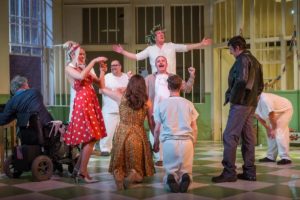
Tag Archives: Playwright
An Interview with Rachel Williams Development Producer, BBC Writers room – Wales

The Director of Get the Chance, Guy O’Donnell recently got the chance to chat to Rachel Williams, Development Producer, BBC Writers room – Wales. We discussed Rachel’s career to date, opportunities for Welsh and Wales based writers and the exciting new plans for BBC Writersroom Wales.
Hi Rachel great to meet you, can you give our readers some background information on yourself please?
Hi , I grew up in Church Village and went to primary school in Treforest, Pontypridd. I did a degree in English at Birmingham University and started out working as a music writer and journalist, and music radio producer before moving into factual television and directing on documentary and Arts series such as The Culture Show and Channel 4’s Cutting Edge. When I had my first child I came back to Wales and moved into TV development – I was Head of development for BBC documentaries where amongst other things I developed Factual drama including Jack Thorne’s ‘Don’t Take My Baby’ for BBC3. Telling fictional stories appeals to me for many reasons but mostly because you can go deep into the story and structure. I feel very privileged to be able to read scripts and work with writers as part of my day job – and also to have licence to watch drama box sets guilt free!
So what got you interested in the arts?
I think my primary school St Michaels in Treforest first sparked a love for the Arts – I still remember my inspirational English teacher Mrs. White and the inventive way she taught creative writing and poetry. I think the Eisteddfod was another huge influence – I was billeted with a family in North Wales to perform at the national Eisteddfod – which was an amazing experience and my first exposure to the Welsh language. I think it’s great that Wales has such a strong culture of valuing and supporting the arts.
You are coordinating the BBC Writersroom Wales, what are the plans for this new initiative?
Writersroom Wales has been set up with the aim of developing new and established writing talent in Wales, to find tangible opportunities for writers across the genres and to help develop more diverse stories about contemporary Wales on network drama and comedy. I started in the role just before Christmas and we are also looking to appoint a freelance script editor/ producer who can work across Welsh language submissions. One of my first jobs is to set up the first BBC Welsh Writers Festival – an event that will bring together the Welsh writing community and launch the Writersroom in Wales. We are also planning an inventive launch event and writers workshop in North Wales in the summer in partnership with Radio Cymru and other partners. We hope to have regular one off writing events, writers residentials for writing commissions. We are going to set up a Writers development programme and work closely with Arts organisations from National Theatre Wales to Fio to It’s My Shout to support and develop writing talent.
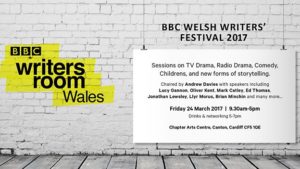
You have organised a Writers Festival on Friday the 24th of March at Chapter Arts Centre, I wonder if you can tell us more about this event?
This is the first BBC Welsh Writers Festival and is modelled on the annual BBC TV Drama Writers festival. We wanted to gather the Welsh writing community together and give them some inspiration, ideas and information about opportunities and also to announce that the Writersroom has landed in Wales. We are putting on a mixture of craft and Q&A sessions giving writers an introduction to everything from Children to Comedy, Radio drama and TV drama. Andrew Davies will chair the day with a Q&A on his writing career followed by a craft session on adaptation, talking about War and Peace. We will also have a Q&A from the brilliant Lucy Gannon who will talk about her writing career across TV and radio. We have sessions on everything from Dr Who to Casualty and Welsh language drama like Hinterland. I’m really excited about the sessions on Comedy Drama and Representing Wales at the end of the day which will be a vital chance to hear from writers and programme makers about the current landscape and hopefully provoke some lively discussion.
http://www.bbc.co.uk/writersroom/opportunities/wales-writers-festival
Get the Chance works to support a diverse range of members of the public to access cultural provision Are you aware of any barriers to equality and diversity for either Welsh or Wales based artists or specifically writers?
I’m not aware of barriers, although arguably there is always a class barrier to becoming ‘a writer’ in the first place. I know there are people in Wales doing brilliant work with under represented communities. The Iris Prize in particular is a fantastic success story that has an international reputation. But I do think there’s a sense that English language drama about Wales has not always reflected the diversity of contemporary Wales. It would be great to see some more diverse stories of Wales on screen – whether that’s about the Somali community in Bute Town or the Italian Welsh community in the Valleys – from a wider range of perspectives. The Writersroom have just produced a second series of the Break for BAME writers – and the next series is coming out of Scotland. It would be great if it could come to Wales the following year.
http://www.bbc.co.uk/mediacentre/latestnews/2016/the-break
http://www.bbc.co.uk/writersroom/successes/the-break
There are range of organisations currently supporting Welsh and Wales based writers, have you met with any of them? How do you see BBC Writersroom Wales working with the current support network for writers?
In the first few months of the job I’ve tried to meet as many dramatic writing related organisations as I can from Ffilm Cymru to theatrical institutions such as Theatr Clwyd and National Theatre Wales. There are already people doing brilliant work in terms of writer support and development such as the Sherman Theatre who run a well respected writer development programme – we don’t want to step on any toes and duplicate work that is already being done. The question for me is how can we work and support existing structures and is there a need for something else that is not currently being addressed? Identifying that need is the sweet spot for the Writersroom – we are here to help fill that gap. But the key thing for us is that any initiative we set up has to have a tangible outcome for the writers at the end of it – whether that it is a slot on radio, TV or online.

Director General of the BBC Tony Hall
The deficit of English Language drama produced by the BBC reflecting the diversity of the citizens of Wales is a cause for concern. Is this something you will be tackling in your new role?
This is an issue that has been identified by Tony Hall and this is partly why BBC Writersroom has been set up in Wales – to nurture and develop the next generation of story tellers writing about Wales. The recent announcement of an additional £8.5m funding for programming in Wales – as well as a new £2m development fund for comedy, drama and factual in the Nations – should be a real boost and help generate new drama and comedy coming from Wales.
http://www.walesonline.co.uk/news/wales-news/bbc-announces-50-increase-investment-12636991
If you were able to fund an area of the arts in Wales what would this be and why?
We already have brilliant writers here working in theatre and radio – what would be great is if there was a vehicle for talented new writers to develop and hone their writing. So much of good writing is about craft – understanding story telling and the beats that make good drama – and this is definitely something that can be refined. Russell T Davies talked about learning to write on daytime drama The Grand – for the first time writing a scene entirely in subtext. I know these sort of long running drama strands are expensive but perhaps we could experiment with form – do it online or in a drama podcast?
What excites you about the arts in Wales? What was the last really great thing that you experienced that you would like to share with our readers?
I love the vibrant theatre scene in Wales, which is full of talented actors and writers. I recently saw Lucy Rivers’ Sinners Club at the Other Room – visceral, immersive ‘gig theatre’ that told a factual story in a clever and layered way. She wrote and performed it – and for what was essentially a monologue the pace never lagged. It’s going to be showing at Theatr Clwyd next. Watching theatre at the Other Room always feels like a treat, as it’s such a small intimate venue.
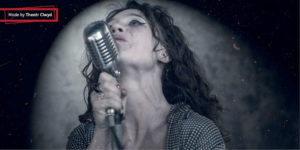
https://www.theatrclwyd.com/en/whats-on/sinners-club/
Thanks for your time Rachel.
